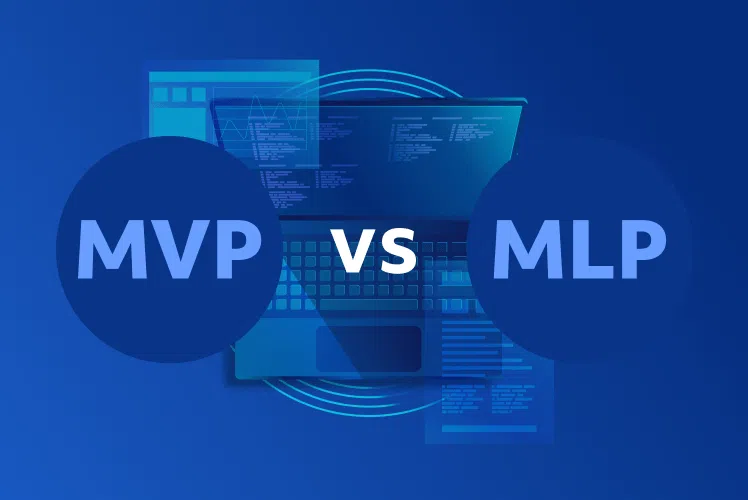For many organizations, cloud has become a new norm due to its security, scalability, and speed. And when talking about the cloud and related services, the two names come to mind: Amazon’s AWS and Microsoft’s Azure.
Both platforms share a very similar functionality, and both offer a wide range of impressive services. So how does a company choose between the two? And which is better, Azure or AWS? In this article, we will provide a comprehensive comparison to help you make the right decision.

What is AWS?
In order to compare AWS and Azure, it’s important to have a solid understanding of both platforms, so let’s start with AWS.
If we address the official definition by Amazon, AWS is “the world’s most comprehensive and broadly adopted cloud”. It is a cloud computing platform with over 200 fully-featured services that fall under three categories:
- Platform as a Service (PaaS)
- Infrastructure as a Service (IaaS)
- Software as a Service (SaaS)
Now, what can you do with AWS (since the terms above may sound a bit confusing)? AWS offers the following options to its users:
- Run web and application servers in the cloud;
- Store all needed files in the cloud (with access to them from anywhere in the world);
- Quickly deliver both static and dynamic files through CDN;
- Use virtual environment to load the needed services and software;
- Build, deploy, and manage applications.
And many more. So, AWS is basically saying, “Here is the cloud environment – you are free to use it however you like”. In addition to traditional services like app hosting or data storage, AWS also provides such services like Artificial Intelligence, data lakes, or advanced analytics.
Main pros and cons of AWS
While the biggest advantage of AWS is probably its impressive and rich functionality, there are several other features that make users choose this cloud platform over alternatives.
The main AWS pros are:
- Ease of use: despite its seeming complexity, AWS is highly user-friendly and intuitive and does not require any training to start working with it. The platform was initially designed with secure and quick access in mind, so users experience no issues when starting to work with it. Moreover, AWS offers many tutorials, guides, and an extensive documentation to help users understand all available services and best ways of using them.
- Security: AWS uses an end-to-end approach to secure its infrastructure, has a few compliance certifications, and adheres to international security standards with the help of several built-in security tools. A good example of an AWS security tool is the Identity and Access Management (IAM) service, which is used to control access to AWS resources.
- Scalability: AWS has a bunch of tools and features (Auto Scaling, Elastic Load Balancing) that allow easy scaling up and down whenever needed. And when scaling, you won’t have to worry about resources and computing power since AWS provides full access to all necessary resources upon the request. Also, if you need to add a couple of new servers, you can do so within mere minutes without disrupting the app’s performance.
- Flexibility: AWS offers you an extensive selection of programming languages, tools, operating systems, and databases, thus allowing you to fully customize your product as needed. You can also load all needed services and software to the AWS environment, which is another big advantage, especially in the case of an app migration.
- Cost-efficiency: with AWS, you pay only for those services and tools that you use, and you do so by “pay as you go” method. AWS also charges you per hour, so keep that in mind when planning the workload.
Nothing is perfect, though – so let’s have a look at some of AWS drawbacks that you need to learn about in advance before jumping into work with the platform.
The main AWS cons are:
- Limitations: AWS has limitations on both resources and security (to a certain extent) so this may come as a disadvantage for some companies. First, Amazon has resources restrictions by default, meaning, you can have only a specific amount of resources for a specific region. While you can ask for more resources, it may still come as a drawback. Second, there are certain AWS features that cannot be changed in terms of security and this may be an inconvenience too.
- Cloud computing issues (temporary): due to an incredibly high workload and millions of users, AWS sometimes has cloud computing issues. Users may experience downtimes or limited control, but these issues are usually quickly resolved. However, you should be aware of the possibility of such things.
AWS certifications
Since work with AWS requires exceptional skills and knowledge as well as deep understanding of the platform itself, in 2013, AWS launched an international certification program. The main goal of the program is to grant certifications to those developers who proved their skills and knowledge in working with AWS.
There are four main categories of AWS certifications:
- Foundational: requires no prior experience and certifies foundational knowledge of AWS;
- Associate: requires prior cloud (or strong on-premises) IT experience, focuses on knowledge and skills on AWS;
- Professional: requires 2 years of AWS cloud experience, validates one’s advanced skills and knowledge on AWS;
- Specialty: focuses on specific specialty (i.e., Advanced Networking, Data Analytics) and allows certified professionals to act as trusted advisors.
The main benefit of receiving an AWS certification is obviously the validation of one’s skills. Certified professionals become open to much more career opportunities and are trusted by clients and organizations. Other perks include competitive salary and a certification badge that you can use to attend specialized events.
What is Azure?
Azure is a cloud platform with over 200 products and services that allows you to access and manage cloud services and resources provided by Microsoft. It is similar to AWS and also provides PaaS, SaaS, and IaaS solutions. If we drill down to the services, there are several big categories worth paying attention to:
- Computing services: include Virtual Machine, service fabric, and functions;
- Networking: includes CDN, Azure DNS, and virtual network;
- Storage: includes disk storage, blob storage, queue storage.
As for Azure use cases, they are pretty much the same as the ones of AWS. With Azure, you can also run applications, store all needed files, use the provided virtual environment, etc. Several more Azure use cases are:
- Artificial Intelligence deployment;
- Work with data and its analysis;
- Work with hybrid cloud and infrastructure;
- Internet of Things;
- Security and governance of your applications.
An interesting thing to note is that unlike AWS, Azure provides great hybrid cloud services and capabilities. In this way, Azure is quite unique, and its hybrid services are a great competitive advantage.
Main pros and cons of Azure
Now, let’s turn our attention to the pros and cons of Azure in order for you to understand the platform better.
The main Azure pros are:
- Scalability: Azure allows businesses to easily scale up and down upon demand, thus providing maximal capacity during peak traffic periods. And since you also pay only for what you use, Azure offers cost-effective yet powerful and relevant solutions.
- Advanced analytics: Azure has a rich selection of built-in analytical tools and offers vast opportunities of analyzing your data, thus, contributing to sustainability of your business. With the help of advanced analytics and intuitive and user-friendly data visualization, Azure users can make more accurate business decisions.
- High availability: One of the biggest benefits that Azure is praised for is its high redundancy and availability. The platform runs in 55 regions globally and is available in 140 countries. Moreover, Microsoft offers a Service Level Agreement of 99.95% availability, which equals to approximately 4.5 hours of downtime per year. And this is something that most businesses struggle to achieve.
- Security: Microsoft pays utmost attention to security and the Azure platform is equipped with all needed security controls. Azure also offers several compliance certifications and has advanced disaster recovery capabilities, which is a big benefit considering how big the consequences of cyberattacks are.
- Cost efficiency: Azure follows the same “pay for what you need only” model as AWS, but charges per minute instead of per hour. And since users pay only for the resources they currently need, the platform enables pretty great budget management.
As good as it sounds, the platform also has certain limitations and drawbacks. Which is okay – but it’s better to know about such things in advance in order to adjust further work correspondingly.
The main Azure cons are:
- Complexity: compared to AWS, Azure is more complex and is less user-friendly. The platform management requires strong expertise and may not be suitable for users without experience in cloud management.
- Data transfer: one of the hidden Azure fees is the data transfer fee, which implies that you pay to transfer data in and out. Based on the volume of transferred data, the final cost may be quite high.
- Complicated pricing: there are hundreds of services in Azure and each service has several complementary services, and each complementary service equals additional fees. All in all, the final cost of your solution will consist of multiple separate fees, and this may be quite complex to manage and monitor.
Azure certifications
Same as AWS, Azure also has a global certification program aimed at recognizing one’s skills and knowledge on the Azure platform. There are also four certification categories:
- Microsoft Azure Fundamentals-Level certifications;
- Microsoft Azure Associate-Level certifications;
- Microsoft Azure Expert-Level certifications;
- Microsoft Azure Specialty certifications.
There are also specialty certifications, such as Azure AI Fundamentals or Azure Data Fundamentals, that cover specific skills. Overall, software engineers certified by Microsoft can easier promote their skills to employers and are a number one choice when it comes to assembling a team for working with the Azure platform.
AWS vs Azure: what is better?
Even though both platforms share a very similar set of services and features, in some ways, AWS is better than Azure and vice versa. Below is a comprehensive table where you can see the main differences and similarities in brief.
| AWS | Azure | |
|---|---|---|
| Release date | 2006 | 2010 |
| Provider | Amazon | Microsoft |
| Availability zones | 61 | 140 |
| Pricing | Per hour | Per minute |
| Pricing models | Offers a free tier, a free trial per minute, you pay for the EBS volume | Offers a free trial |
| Storage | AWS offers the following storage services: Buckets S3 EBS SDB Easy to use SQS Domains CloudFront AWS Import/Export | Azure offers the following storage services: Blob Storage Azure Drive Storage stats Table Storage Containers Tables |
| Databases | AWS offers the following database services: MySQL DynamoDB Oracle | Azure offers the following database services: MS SQL SQL Sync |
| Hybrid cloud | Is still improving its hybrid cloud services | Strong support for Hybrid Cloud |
| Cloud type | Virtual Private Cloud (VPC) | Virtual Network |
| Big Data storage | The EBS storage is great for storing Big Data | The standard storage has issues with storing Big Data so you will have to buy a premium storage |
| Ecosystem | Big, with many partners | Limited, with a few Linux options |
| Licensing | A variety of license choices | Limited, if compared to AWS |
| Machine access | You can access machines separately | Machines are grouped into a cloud service and respond to one domain name with different ports |
| Security | High: offers user-defined roles with exceptional permissions controls, has granular IAM, robust security groups | High: offers Azure Active Directory as a single source for permissions management and authorization. |
| Maturity | High | Moderate/Low |
| Long term data archiving | Allows long term data archiving | Does not allow long term data archiving |
AWS vs Azure comparison
Now that we’ve briefly walked through the main differences between Azure and AWS, as well as through their similarities, let’s look at both platforms and their features in more detail. Such a comparison will help you better understand which solution will meet your needs the best.
Computing power
When talking about the cloud, the main concern about the computing power is usually its scalability. AWS resolves the issue with EC2, aka elastic cloud computing. EC2 has elastic resource provisioning, meaning, the available resource footprint may increase or shrink on demand. With the help of EC2, users can build Virtual Machines (VMs), pick pre-configured Machine Images (MIs), or modify them. In addition to EC2, AWS also offers such computational services as EC2 container service, AWS Lambda, Autoscaling, and Elastic Beanstalk.
As for Azure, users can create a Virtual Machine from a Virtual Hard Disk (VHD) that uses virtual scale sets to ensure the needed scalability.
Note that EC2 can be customized for different use cases, and Azure VMs work together with other cloud deployment tools.
Storage
Both AWS and Azure offer an infinite number of permissible objects, but they differ in object size restrictions: Azure has a 4.75 TB limit and AWS has a 5 TB limit. Both AWS and Azure offer adequate and strong storage, but its types differ.
AWS provides Amazon simple storage service (S3), elastic block store (EBS), and Glacier. The S3 service provides high availability and automatic replication across various regions. As for the temporary storage, it starts operating every time the instance starts and stops, correspondingly.
Azure’s storage services include blob storage, disk storage, and standard archive. The block storage option in Azure serves as a counterpart to the S3 of AWS. Another interesting feature of Azure is that it has two storage types: hot and cold. The hot tier is optimized for storing the data that is accessed/modified frequently, while the cold tier is correspondingly optimized for storing the data that is rarely accessed/modified.
Databases
AWS and Azure effectively handle both structured and unstructured sets of Big Data and have multiple services for its storage and processing.
AWS has a relational database service RDS that is compatible with MariaDB, Amazon Aurora, MySQL, Microsoft SQL, PostgreSQL, and Oracle database engines. There is also a variety of NoSQL AWS databases, such as Amazon DynamoDB, Amazon ElastiCache, Amazon Neptune, or Amazon Timestream.
Azure SQL database is naturally based on Microsoft SQL. The NoSQL option that Azure offers is Azure Cosmos DB NoSQL database.
While Azure provides a more user-friendly interface, AWS has better provisioning capabilities. Both platforms offer extensive analytics services and Big Data capabilities, and they can be considered equally good in terms of database performance. Note though that AWS provides a more mature environment for Big Data in general.
Security and data privacy
AWS provides excellent built-in security but the main thing to keep in mind is the shared responsibility security model. That means that AWS takes care of the security of everything that’s in the cloud but the client also has to take security measures such as access configuration or data encryption.
Azure uses a Microsoft’s Cloud Defender service that is based on Artificial Intelligence and is highly effective in detecting and mitigating threats. However, same as AWS, Azure is not 100% secure by default, so you will have to double-check all configurations and apply security measures if necessary.
Ease of use and documentation
If we compare AWS to Azure, not only is AWS more mature, but it is also much more user-friendly than Azure and is suitable even for users with no prior cloud experience. With intuitive dashboard and extensive documentation, AWS is highly suitable both for experienced and novice users.
Azure is more complex, less intuitive, and its documentation is not so extensive and user-friendly. In this way, AWS is a clear winner.
Content delivery and networking
AWS offers Virtual Private Cloud (VPC) to create isolated private networks and enables cross-premises connectivity through API gateways. The use of VPC allows users to create subnets, route tables, and private IP address ranges. And if you worry about performance, AWS deploys elastic load balancing during network connectivity.
Azure has a Microsoft Azure Virtual Network, which can be called a counterpart of AWS. It performs all the same functions as VPC does and shows a high level of performance.
Conclusion
When comparing the two platforms, it is impossible to say which one is better, AWS or Azure. Both platforms have their strengths and weaknesses, and both platforms are loved by hundreds of organizations worldwide. Even though AWS is considered a leading cloud platform, Azure is steadily gaining traction and is considered a great alternative to AWS. Thus, when choosing between the two, carefully analyze the exact needs of your business and see which platform will meet them best.



Comments